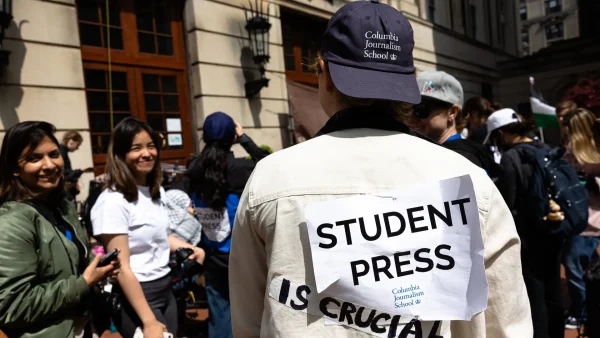A look back on the Minneapolis teacher strike, and a look forward on upcoming commissions
A poster representing the mutual support of the Minneapolis educators and nurses, two unions who’ve found common ground regarding their fights for stability. “Unions have really dwindled over the last 50 or so years, but now their having this major comeback,” says Greta Callahan, president of the MFT, teacher chapter. “That’s essential for rebuilding the middle class, racial equity, [and] for social issues.”
October 25, 2022
In Minneapolis Public Schools, educational staff being underpaid and mistreated isn’t new. The last strike before 2022 was 52 years prior, with similar concerns as this year. With the most recent strike, teachers and education support professionals (ESPs) got only some of what they asked for. Previously, ESPs got paid 28,000 at the highest, and around $15.45 per hour at the lowest. Post-strike, they’ve seen an increase to 35,000 for full-time ESPs, and a boost of about 20% for the lowest-paid ESPs to $18.00. “There’s a lot of work yet to be done,” stated Travis Collins, an SEA in the life skills program and a Union steward for the ESPs.
The Minneapolis Federation of Teachers (MFT) negotiates under three separate contracts; the ESPs, licensed “birth through 12th grade”, and the adult educators. The workers under these contracts went on strike together on March 8th, 2022. The strike lasted 3 weeks, and on March 25th, Minneapolis district leaders along with the union agreed on a tentative agreement that would send teachers back the following Monday, and students on Tuesday. Over the weekend, MFT members would vote to ratify the pending contract, winning a living wage for ESPs, class size caps, more mental health supports for students, groundbreaking language around supporting and retaining educators of color, and the highest raising teachers have seen in over 22 years. “And we should have won more,” says Greta Callahan, president of the Minneapolis Federation of Teachers’ teacher chapter.
Callahan emphasizes how, although changes were made, not all goals were met. Yes, ESPs have obtained better wages, but it’s not an automatic step-increase. More mental health supports have been implemented, but only in some schools. Class size caps are higher than desired. As for support and retention of educators of color, the language MFT members had argued for was an increase in mentors of color in the district, and a support council for educators of color. The district, however, did not abide, arguing for an advisory council instead. Furthermore, the contract expires after 2 years, meaning the union will have to fight for it again. Callahan feels this demonstrates that supporting and retaining educators of color was not a top priority to the district.
After 3 long weeks of non-stop fighting for an inclusive and fair contract, and the exchange finally ending in a provisional hesitant consensus, what comes next? What more is there to do to ensure stable school environments? Callahan voices how the strike gave “hella” insight into the particulars of negotiating. This is important because a significant attribute of the contract the MFT had fought for is its 2-year expiration date. The MFT had previously been working under an expired contract, and therefore the current contract agreed upon with the district will expire at the end of this school year. This indicates a need to gear themselves up to fight for it again this upcoming year. “We made a lot of mistakes and we did a lot of things right,” Callahan mentions that something they’ll change for the future is the size of their bargaining teams. “They were pretty small. Which really made the weight of the world be carried on a handful of peoples’ shoulders.” They plan to execute “big bargaining” this upcoming year, including having a representative from every school site on the bargaining team. This tactic will help with transparency between the members because someone will always be in the know on each education site. Since the strike, MFT has spent time preparing for this by attending conferences and getting involved with the atmosphere of bargaining to further accustom themselves to this process.
Ben Carpenter, an English teacher at South High, was laboriously involved at the forefront of the strike. When asked about what should be done in the future for the benefit of teachers and students, he had lots to say: “Continuing to fight for what we deserve, like getting the class size caps down, getting raises that actually match inflation would be amazing, and continuing to fight to ensure students have the supports that they need.” Carpenter remarks that post-strike, he has a lot more faith in MFT, that he trusts the leadership, and truly believes that they have our best interest in mind. “I think that we proved in a sense that we can make progress, even if it’s incremental.”
As previously stated, the Union will have to fight again soon for the renewal of their contract, as well as any additions they’d like added. Carpenter hopes leadership has changed at the district level, and that striking won’t be necessary in the near future for progress. However, he believes that striking was a powerful tool, one wielded with both positive and negative momentum. A sort of leverage the district didn’t have, but together and united, the union did. “We have proved that we will do it if necessary,” Carpenter declared.
Collins discussed the ESP side of matters and its future developments. He touches on making community members and teachers aware of the realities of ESPs regarding wages, salaries, and other various inequities that separate ESPs from teachers. “I think the biggest thing is maintaining this ESP/teacher solidarity,” Collins reflects. “Teachers have automatic step increases in their salary every year and ESPs don’t have that (…) we want to see those steps become automatic for us too.” The fact that the majority of openings in schools are ESP positions, as well as the number of unpaid days ESPs are forced to take off, are just a few examples of matters that need to be taken care of moving forward.
Reflection and consideration have been some of the key concepts on the table for the union in these past months. Political action and negotiations are accelerating as well, regarding the upcoming gubernatorial election on November 8th for a new governor. The union is also focused on the upcoming school board election, which will also take place on November 8th of this year. Getting community members involved in supporting candidates is an important measure to take, because having a governor that’s pro-public education makes for an essential facet in the long run.
The educators of Minneapolis have been under a multi-layered configuration of pressure and intense decision-making for quite some time now. The Union has taken time to chew over this past year and reflect on what can be improved for future bargaining. Moving forward, the future holds many possibilities for elections, negotiations, and improvements to every component of public education in Minneapolis. With another round of negotiations right around the corner, the Union remains a united front and will continue to fight the battles necessary for the rectification of the Minneapolis Public School system.

![A poster representing the mutual support of the Minneapolis educators and nurses, two unions who've found common ground regarding their fights for stability. “Unions have really dwindled over the last 50 or so years, but now their having this major comeback,” says Greta Callahan, president of the MFT, teacher chapter. “That’s essential for rebuilding the middle class, racial equity, [and] for social issues.”](https://www.shsoutherner.net/wp-content/uploads/2022/10/nursesstrikeFinished.jpg)




